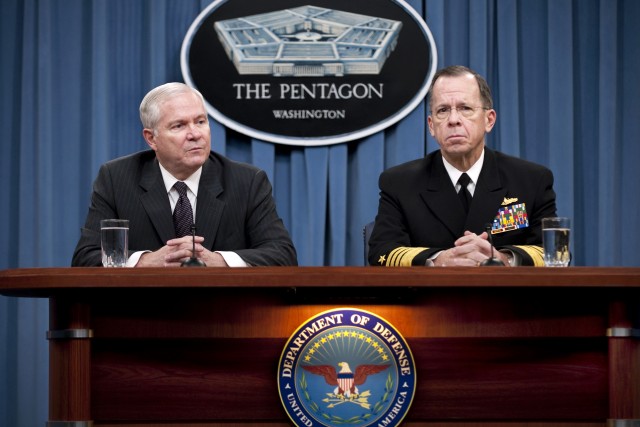WASHINGTON (Feb. 1, 2010) -- When Defense Secretary Robert M. Gates came to his post two years ago, he recognized a glaring deficiency in the defense budgeting process: "Those fighting the current war had no seat at the budget table at all."
That's changed significantly, Gates told Pentagon reporters today in discussing the fiscal 2011 budget requests, as well as the 2010 Quadrennial Defense Review and Ballistic Missile Reviews, all released today.
The 2010 QDR is the first to identify "prevailing in today's wars" as a primary objective, the secretary said. It's supported by three budget requests submitted today: the $548.9 billion fiscal 2011 base budget; $159.3 billion fiscal 2011 overseas contingency operations request that will fund operations in Afghanistan and Iraq next year; and the $33 billion fiscal 2010 supplemental request that covers costs of implementing the new Afghanistan strategy.
The budget submissions and reviews build on reforms already under way, Gates explained, to balance capabilities within the department to meet current warfighters' needs while preparing for future threats.
"Achieving our objectives in Afghanistan and Iraq has moved to the top of the institutional military's budget, policy and program priorities," Gates told reporters. "We now recognize that America's ability to deal with threats for years to come will depend importantly on our success in the current conflicts."
Toward that end, the fiscal 2011 budget requests take additional steps to fill what Gates called "persistent shortfalls that have plagued recent military efforts, especially in Afghanistan."
Gates noted several examples:
Aca,!Ac More intelligence, surveillance and reconnaissance capability, including a 75 percent increase in combat air patrols by the most advanced unmanned aerial vehicles over the next few years;
Aca,!Ac $9 billion in new helicopter investments, and two new Army combat aviation brigades, and;
Aca,!Ac Growth within U.S. Special Operations Command by nearly 2,800 people and additional operational systems.
Navy Adm. Mike Mullen, chairman of the Joint Chiefs of Staff, said he's "confident" the fiscal 2010 supplemental and fiscal 2011 overseas contingency operations requests "provide our troops what they'll need to complete a responsible drawdown in Iraq, and execute the president's strategy in Afghanistan and Pakistan."
The chairman identified several highlights:
Aca,!Ac $1 billion in fiscal 2010 funding and $2 billion in fiscal 2011 funding to help the Iraqis build the security structure required to support U.S. drawdown plans there;
Aca,!Ac Accelerated training of Afghan national security forces;
Aca,!Ac More force protection for U.S. forces in Afghanistan, including $1 billion to complete the mine-resistant, ambush-protected program, with $3.4 billion in the fiscal 2011 request to sustain it, and;
Aca,!Ac More than $1 billion for the Commander's Emergency Response Funds Mullen said have "proven to be game-changers inasmuch as they give our troops more flexibility to truly make things happen for the local population, wherever they are."
Gates said the cumulative effect of the 2010 and 2011 budget requests, along with the QDR recommendations, "make sure this department is doing everything we can - and more - to prevail in the wars we are in, while preparing our military to confront the most likely and lethal threats in the future."
Two major themes shaped them, Gates said: reforming the way the department does business and infusing the process with "a bracing dose of realism" regarding both risks and resources.
"We have, in a sober and clear-eyed way, assessed risk, set priorities, made tradeoffs and identified requirements based on plausible, real-world threats, scenarios and potential adversaries," the defense secretary said.
As an example, Gates said he urged those compiling the QDR to look beyond what he called an outdated assumption that's guided U.S. defense planning and requirements for decades - that its forces be able to fight two major conventional wars at once.
"We already are in two major operations," he said. "What would happen if we would have a homeland disaster' What if we should have another encounter' What if we have a Haiti'"
The department's leadership, Gates said, now "recognizes that we must prepare for a much broader range of security challenges on the horizon." Those challenges, he said, range from new technologies that deny access to sea, air, space and cyberspace, to terror inflicted by non-state actors.
"As a result, the United States needs a broad portfolio of military capabilities with maximum versatility across the widest possible spectrum of conflict," Gates said. "This strategic reality shaped the QDR's analysis and subsequent conclusions, which directly informed the program decisions contained in the budget."
Gates emphasized the importance of ensuring defense dollars are used wisely.
"Every defense dollar spent on a program excess to real-world military needs is a dollar not available to take care of our people, reset the force, win the wars we are in, and improve capabilities in areas where we are under-invested and potentially vulnerable," he said.
"That is a risk the president and I are not prepared to take," Gates said.


Social Sharing